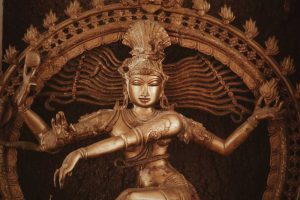Yoga Teacher Training – Bringing Yoga Mythology Into the Classroom
Yoga Teacher Training
Mythology is a powerful source of yogic wisdom. Its relevance to yogic ideals is well documented. Many yogic postures are named after mythical figures and stories. This course is for yoga teachers and advanced practitioners who wish to leverage the power of Indian philosophy, mythology, spirituality, and ancient Indian cosmology for their next level yoga teaching.
The Online Yoga Mythology Course includes a deep dive into the Hindu mythological traditions, their pivotal role in perpetuating yogic themes, and how they may be applied to our own spiritual practice. Through compelling storytelling and embodied esoteric insight, students will receive the tools to harness the profound teachings of yoga mythology for their personal growth.

Introducing mythology to a yoga class is a wonderful way to expand the depth of the practice and make it more accessible for all students. This 4-module online course will teach you how to incorporate myth and mystery into your classes using a variety of teaching methods, including storytelling and embodied esoteric insights.
Yoga Teacher Training – Bringing Yoga Mythology Into the Classroom
It will also provide an overview of the Hindu religion, including its philosophies of life and death, reincarnation, and the Subtle Body. Students will also gain a deeper understanding of the origins and evolution of yogic asanas, mudras, mantras, and chanting, as well as their corresponding philosophical teachings.
Many yogic asanas are named after stories and characters from the Hindu mythological traditions. Getting to know these stories allows us to understand the deeper philosophy behind each pose and how it can be used to help you on your own spiritual journey.
The tales of Matsyendra, Goraksha, and Daksha are some of the most popular yoga myths. Their stories have been told in different ways over the centuries, but they all share a common theme: spiritual transformation.
Yoga is often labeled as a Hindu religion, but it’s not. The yogic sciences developed in India, and it is therefore natural that they would become associated with the culture that produced them. But it is important to remember that yoga was nurtured by multiple traditions of Hinduism, Jainism, and Buddhism.
These traditions have their own unique philosophies of life and death, but they all emphasize the importance of devotion, consistency, and loyalty to your practice. They all value the concept of rebirth, and they all promote the idea that yoga can be a means to realize your physical, psychological, emotional, intellectual, mystical, and occult potential.
This course is open to all yoga teachers and advanced practitioners. It will count as 30 hours of continuing education credit for The Kaivalya Yoga Method teacher training and as non-contact hours for Yoga Alliance. For more information, see our Terms & Conditions. This website uses cookies. By continuing to browse our site, you agree to our cookie policy. You can withdraw your consent at any time.